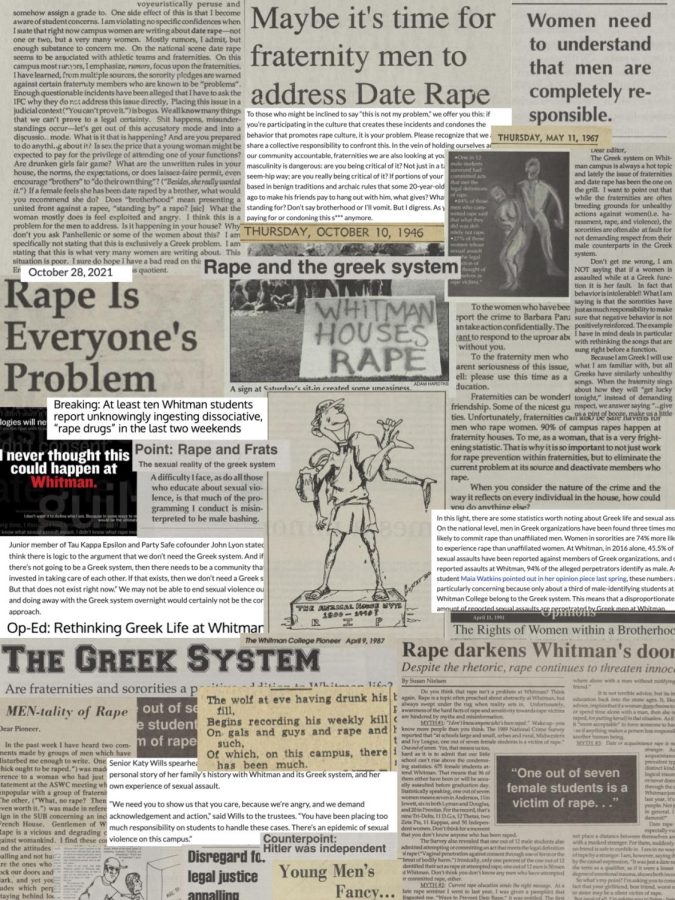Four months of peace and conflict studies in the Balkans taught me how to recognize genocide and ethnic cleansing, and as I step back on campus I’m overwhelmed by their evidence. I’m overwhelmed not only by the way white supremacy, imperialism and genocide intertwine with the history of Whitman College, but by how little that history has changed.
We (the Whitman community) know about the missionaries who settled in this region, and we know that Whitman was founded in their honor. We can agree that the genocide of North America’s native population was tragic and that religion and pale skin should not justify it, but where we disagree is in the present. Disowning the college’s religious affiliation and dedicating a rock next to Maxey Hall do not atone for Marcus Whitman’s “arrival” (read: invasion) and how foreigners continue to occupy this land.
In her convocation speech last semester, Professor Elyse Semerdjian aimed to open a critical analysis of Whitman’s origins and the imperialist legacy it carries, but her argument was overshadowed by reactions to the case study she used as a point of comparison. So let’s try again this semester, because it is our responsibility to acknowledge that this institution, and many like it across the nation, is inherently racist. It is our responsibility to understand how all of us on campus continue to engage in imperialism and genocide every day.
I learned very quickly in the Balkans that marking territory is a central component of claiming and “cleansing” land. This campus is rife with territorial demarcation. Many symbols of the violence surrounding Whitman are obvious, such as the school mascot (the Missionaries), the name of the school paper (The Pioneer) and the very name of our college, in honor of Marcus Whitman, whom local tribes consider responsible for the death of a couple hundred natives. Other symbols escape our attention, like the school’s official seal which pays tribute to the three states “saved” by Marcus Whitman (see this explanation on Whitman’s website).
By contrast, there are only a few traces of local tribes around campus, reflecting the power dynamic between Whitman College and the native community. Even Treaty Rock by Maxey Hall, long believed to be a gift from regional tribes, is a testament to white supremacy and imperialism. In her convocation speech, Professor Semerdjian noted that far from honoring the region’s tribes, that rock commemorates a treaty that natives signed “under duress,” choosing exile over slaughter. She revealed that it also symbolizes “the establishment of Indian sovereignty”–– that is to say their confinement to designated spaces –– and the legal battle they have been fighting ever since for basic human rights on their own land.
So are we honoring the native community or are we honoring their obliteration? By expressing pride in Whitman through these monuments and symbols, we celebrate acts of genocide.
One-sided, broken narratives of the past are also a common theme in countries that experience ethnic cleansing and genocide. Memories of various atrocities in the Balkans and our narrative of Walla Walla’s history are similarly skewed in that official versions of the truth dominate discussion to the point where an entire group of people and their perspective disappear.
One example is how we remember the death of Marcus Whitman in “the Whitman Massacre.” The college website explains this massacre as “revenge” for the hundreds of Native Americans who died of an outbreak in disease while they were under Marcus Whitman’s supervision, defending Whitman as someone “well-meaning.” In this version of the past and all others, the death of a dozen white settlers is called a “massacre” while there is no name for the death of hundreds of natives directly preceding it.
Other atrocities in American history are nameless as well. We vaguely call the initial invasion “discovery;” the occupation “colonial America;” the white supremacy that fueled expansion “exploration,” “manifest destiny” and “missionary work;” and the near extermination of this continent’s native population “settlement.” Omitting Native Americans and their perspective is a habit, dangerous because it asserts their annihilation. We in fact continue the genocide by cleansing them from our consciousness, because in this way we cleanse our conscience.
Contrary to popular belief, we are responsible for the past –– at least, for how we remember it. We are responsible for the way we choose to discuss this institution and its history, for how we celebrate mass murder and for how we acknowledge the Native Americans, whose oppression and genocide we benefit from every day.








